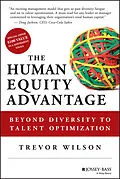A fresh approach to the old problem of "diversity fatigue"
Trevor Wilson, global diversity strategist and visionary leader,
presents a fresh, new management model that goes beyond the
traditional diversity debate towards inclusion and building human
capital. Featuring case studies and practical diagnostic tools and
assessments, this book will benefit anyone who is interested in
improving their business by building on the unique talents of
employees' innate strengths, unique abilities, personality,
attitude, life experience and virtues. The agent of this change,
the driver of the process, is the equitable leader.
This important book outlines 8 core competencies that will guide
leaders to create equitable and inclusive work environments where
employees are valued because of, not in spite of, their differences
and each person can be recognized and developed to strive for their
highest potential.
* Includes a new paradigm for diversity initiatives and finds new
solutions
* Reveals the core competencies that help leaders create an
equitable and inclusive workplace
* Shows how companies can improve hiring and retention, reduce
turnover, increase productivity, improve teamwork, and ultimately
increase the bottom line
The Human Equity Advantage gives you the tools to tap
into the unique talents and strengths of each employee.
Autorentext
Trevor Wilson is the creator of the human equity management model. He is the global diversity, inclusion and human equity strategist and CEO of TWI Inc. TWI's clients include some of the most progressive global employers in the world, including Coca-Cola, Ernst & Young, BNP Paribas, and Home Depot. TWI's trademarked human equity approach was instrumental in catapulting Coca-Cola's South Africa division to the top performing division worldwide.
Klappentext
Praise for The Human Equity Advantage
" Human equity challenges the boundaries of current thinking on diversity and inclusion because it represents a natural evolution from focusing on organizational barriers to empowering the individual and the organization collectively. By creating a platform where each person and organization can determine whether a person's unique skills and attributes are appropriately aligned and fit with the organization's objectives, it provides a real breakthrough strategy that will also address diversity fatigue."
—Stephen Shea, Managing Partner, People, Ernst &Young, Canada
" Trevor Wilson's experience and knowledge shine through in this important contribution, offering fresh perspectives focused on the value of equity in support of optimizing human capital—a must-read for leaders and other stakeholders."
—Dr. Fiona Bartels-Ellis, OBE; Global Head of Diversity, British Council
" The Human Equity Advantage is a must-read resource for leaders and managers who want to move past tired lectures about diversity and into a model that focuses on how to leverage the unique talents of every individual in their organization."
—Shelton J. Goode, Manager, Diversity & Inclusion, Georgia Power Company
" Wilson's human equity model advances diversity, crystallizes it as a manifestation of strengths of character that foster well-being, and imbues life with meaning and purpose. Intellectually stimulating, Wilson has crafted a holistic endeavor that explores, expresses, and enhances the very best attributes that make our work and life worthy of living."
— Tayyab Rashid, Ph.D., C.Psych, Health & Wellness Centre, University of Toronto Scarborough
" As Trevor explains, being inclusive starts with leaders going back to basics and remembering that people are individuals first and part of a group second. Our actions should value and respond to the needs of each individual to help them develop and contribute to their full potential and be all they can be."
—Bill McFarland, CEO and Senior Partner (Canada), PricewaterhouseCoopers LLP
Zusammenfassung
A fresh approach to the old problem of "diversity fatigue"
Trevor Wilson, global diversity strategist and visionary leader, presents a fresh, new management model that goes beyond the traditional diversity debate towards inclusion and building human capital. Featuring case studies and practical diagnostic tools and assessments, this book will benefit anyone who is interested in improving their business by building on the unique talents of employees' innate strengths, unique abilities, personality, attitude, life experience and virtues. The agent of this change, the driver of the process, is the equitable leader.
This important book outlines 8 core competencies that will guide leaders to create equitable and inclusive work environments where employees are valued because of, not in spite of, their differences and each person can be recognized and developed to strive for their highest potential.
- Includes a new paradigm for diversity initiatives and finds new solutions
- Reveals the core competencies that help leaders create an equitable and inclusive workplace
- Shows how companies can improve hiring and retention, reduce turnover, increase productivity, improve teamwork, and ultimately increase the bottom line
The Human Equity Advantage gives you the tools to tap into the unique talents and strengths of each employee.
Inhalt
Foreword by Lamarr Lark ix
Foreword by Gerry Bouey xi
Part One: Beyond Diversity to Human Equity: the Required Shift 1
Chapter One: Diversity Fatigue and the Unfulfilled Promise of Diversity 3
Chapter Two: The Evolution of the Equity Continuum 29
Case Study: Mount Sinai Hospital's Workforce Census 51
Chapter Three: The Essential Role of Leaders and Managers 61
Case Study: Ontario Public Service Diversity Mentoring Partnership Program 75
Part Two: Implementing Human Equity 85
Chapter Four: Human Capital and the Differentiation of Talent 87
Chapter Five: Talent Differentiation in Action 105
Case Study: Dynamic Industrial Company Practices Talent Differentiation 106
Chapter Six: The SHAPE of Talent 121
Chapter Seven: The Eight Core Competencies of the Equitable Leader 143
Case Study: The Equitable Leader Assessment at Deloitte 167
Chapter Eight: Ernst & Young: A Journey Toward Human Equity Leadership 173
Part Three: Measuring Human Equity 191
Chapter Nine: Arriving at the Human Equity Assessment Tool 193
Chapter Ten: The Equitable Leader Assessment 211
Case Study: Ontario Ministry of Labour Equitable Leadership Assessment 233
Conclusion: The Why of Human Equity 247
Afterword: My Why of Human Equity 253
Appendix 263
Glossary 297
Special Offer 301
Index 303
